Fatima Issues
 |
 |
 |
 |
 |
 |
 |
Fatima Issues
The Consecration of Russia
We recently received from circles close to the author ... We are glad to be of assistance in this matter. The Editor
As May starts and the 100th anniversary of Fatima approaches, we see that the Consecration of Russia still has not been achieved according to the wishes of Our Lady of Fatima. 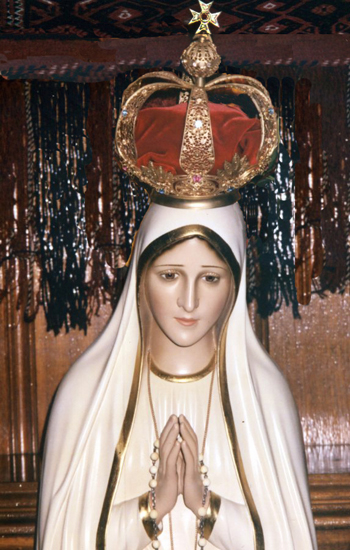
Our Lady looks sadly at a world that has disregarded her command
Our Lady of La Salette said, "The heads, the leaders of the people of God, have neglected prayer and penance, and the Devil has darkened their minds; they have become those wandering stars which the ancient devil will drag with his tail to destruction."
Can you imagine if every Catholic Bishop in the world on the same day and even perhaps at the same hour would have a special service to consecrate Russia in their jam-packed Cathedrals throughout the world? There would be no mistake and the world would know that Russia was consecrated to the Immaculate Heart of Mary in the manner required by Our Lady of Fatima. The promised conversion of Russia and the resulting changes would become obvious, and then that conversion would spread to other countries. A very simple plan that became too difficult even to try.
In 1931 the Bishops of Portugal consecrated their country to the Immaculate Heart of Mary. They promised again in 1936 to re-consecrate Portugal if their country was spared the horrors of the Spanish Civil War. Our Lady obliged. Again in 1938 the Bishops renewed their national consecration to the Immaculate Heart of Mary. On February 4, 1939 seven months before the declaration of war, Sister Lucy wrote to Bishop da Silva and told him that war was imminent, but then added:
"In this horrible war, Portugal would be spared because of the national consecration of the Immaculate Heart of Mary by the Bishops." Portugal escaped World War II completely as the Mother of God promised, proof that she will provide the world a period of peace if her wishes are honored.
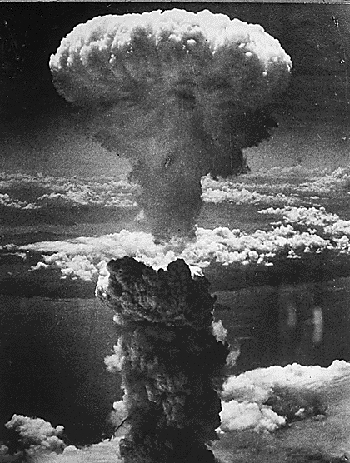
The atomic explosion in Nagasaki could have been avoided had Pius XI heeded Our Lady's order
King Louis XVI lost his monarchy exactly 100 years to the day of the initial request by St. Margaret Mary to consecrate France to the Sacred Heart of Jesus. Three years later the King was beheaded. Will the Pope be killed as foretold in many prophecies? Will Rome lose its authority like the King lost his?
Later Our Lord, complaining to Sister Lucy, said: "They did not want to heed my request. Like the King of France they will repent and do so, but it will be late. Russia will already have spread her errors throughout the world, causing wars and persecutions of the Church. The Holy Father will have much to suffer."
We know from the words of both Our Lady and Our Lord that Russia will be consecrated. The obvious question is when it will happen. There is strong evidence to indicate that the time is late, if the St. Malachy prophecy is true and if we apply to Fatima the 100 years used for the Kings of France.
The consecration would have been much easier in the days of Pius XI. If you read the words of Our Lord carefully there is an extra requirement. Repent! Surely, the Pope will have much to suffer when he confesses for the heresies of Vatican II, the sins of not obeying the wishes of Our Lady, the destruction of the Holy Mass and the list goes on and on. How can Russia be consecrated without this admission?
Can we even imagine the reaction of the Catholic world when such a confession takes place? It might be something like the vision of little Jacinta of Fatima. Lucy wrote one day Jacinta called out to her if she had seen the Holy Father, and said:
"I don't know how it was, but I saw the Holy Father in a very big house, kneeling by a table, with his head buried in his hands, and he was weeping. Outside the house, there were many people, some of them were throwing stones, others were cursing him and using bad language. Poor Holy Father, we must pray very much for him.�
In four more years we will have the 100-year anniversary of the apparitions of Fatima and of the command Our Lady gave to the Pope to consecrate Russia. If the consecration is not made in these years, perhaps we will see the chastisement come against the Papacy, such as the one that fell over the King of France.
1. I am not, nor have I ever been sede-vacantist even if some inattentive commentators have sought to see traits of sede-vacantism in the study on the theological possibility of a heretical Pope, which is part of my book, La Nouvelle Messe de Paul VI, Qu�en Penser? (1) Based on sound traditional dogmatic theology, regarding the Pontificates of the last decades, I do not see how it would be theologically possible to declare the See of Peter vacant at any moment. (2) If Divine Providence gives me the strength, I will soon publish a study on the theological errors of current sede-vacantist theories.
2. For every Catholic careful of his faith, the Pope is the "sweet Christ on earth," the pillar and foundation of the truth. However, great Saints, Doctors and Popes admit the possibility of the Pope falling into error and even heresy. And one cannot rule out the theological possibility that such a failing can occur in official documents of the Pope and in Councils with the Pope. (3)
The statement by Archbishop M�ller
3. Last November 29, L�Osservatore Romano published a text by Most Reverend Archbishop Gerhard Ludwig M�ller, Prefect of the Congregation for the Doctrine of the Faith, the former Holy Office, titled �An Image of the Church of Jesus Christ that Embraces the Whole World.� Commenting on the December 22 speech to the Roman Curia in which Benedict XVI declared that Vatican II should be the object of a �hermeneutics of reform in continuity� facing a �hermeneutics of discontinuity and rupture,� Archbishop M�ller writes that what Pope Benedict XVI has termed �the hermeneutics of reform, of renewal in continuity� is the �only possible interpretation according to the principles of Catholic theology.�
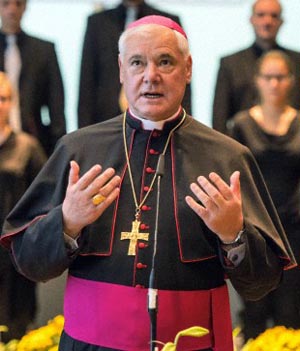
Archbishop Mueller affirms traditionalists in genere hold a heretical position
4. Here I will not delve into certain points of this statement such as the issue of the �hermeneutics of reform in continuity� and the �hermeneutics of discontinuity and rupture,� Nor will I analyze the phrase in which His Excellency states that progressivists and traditionalists �share a common rejection of the Council.� Nor will I comment on the title of Archbishop M�ller�s text with the ambiguous and suspect expression ,�a Church of Jesus Christ that embraces the whole world.�
Nor will I speak about the fact that finally, after many decades, a condemnation of Progressivism came, which would be promising if it only had canonical force, were doctrinally enforced in Catholic life and the teaching in seminaries, and used as a criterion for ecclesiastical promotions, etc. It would be promising and an omen of better times because then the Prefect of the Congregation for the Doctrine of the Faith would be seriously proscribing Progressivism as heretical.
The extreme gravity of this condemnation
6. Indeed, the force of this condemnation should not be underrated. Logic imposes itself: anyone who heretically interprets an Ecumenical Council is a heretic. No one can claim that his statement is irrelevant because it is not a formally canonical condemnation. It is a serious thing for the Prefect of the Congregation for the Doctrine of the Faith to have said what he said. It is a serious matter that in his rehearsal of launching a first anathema against traditionalists, he hid behind the screen of doctor privatus [speaking as private doctor].
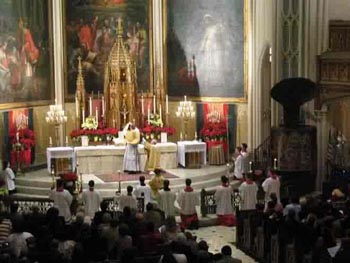
all these traditionalists condemned as heretics, as M�ller suggests?
7. As St. Thomas Aquinas teaches, �heresy is essentially opposed to the Faith,� (4) and �heretics are those who profess the Faith of Christ but corrupt its dogmas.� (5) �Faith is first among the virtues�; (6) �for it is a much graver matter to corrupt the Faith which quickens the soul, than to forge money which supports temporal life.� (7)
8. The Scope of the Condemnation � The modern world has lost both the notions of Faith and of the gravity of heresy. Integrity of Faith is the starting point of Catholic life. A formal heretic does not have the theological virtue of faith and as such is excluded from the Church. Archbishop M�ller�s condemnation was made with generic, terse words. Given the importance of this matter, those affected by his anathema are entitled to ask him to make explicit its scope and theological, canonical and practical consequences � even if only in sede theoretica [theoretically speaking], in the case that it were valid.
Vatican II and the infallibility of the Church
11. The Extraordinary Magisterium? According to the Vatican Council I, the Pope is infallible when, in teaching the Universal Church in revealed matters of dogma or morals, he solemnly defines a given truth as one that must be believed by the faithful. According to the doctrine established by theologians, these conditions of papal infallibility apply, mutatis mutandis [duly adapted], to Ecumenical Councils, whose infallible definitions impose, therefore, on the faithful the strict obligation of professing the proposed doctrines.
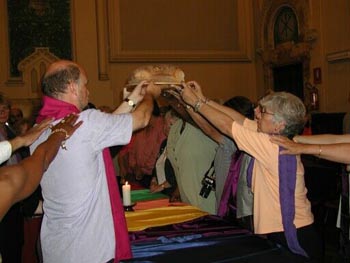
Fruit of Vatican II: Parishioners concelebrate with their priest in Gottesdiens
12. The Infallible Ordinary Magisterium? According to Vatican I, the �ordinary and universal Magisterium� is also infallible. In order for it to be so, in her daily teaching the Church must impose a truth as having to be believed not only throughout the world but also with continuity in time so that it becomes patent to every one of the faithful that that truth was revealed and must be professed under pain of abandoning the Faith.
In this context, the concept of �universal� is not always interpreted correctly, as some understand it merely as indicating universality in space, that is, in the whole world. According to this view, all the teachings of Vatican II are infallible because they were solemnly approved by the Pope with the moral unanimity of the Bishops. In reality, individual magisterial acts by the Pope and Council as they occurred in Vatican II cannot define dogmas of the ordinary Magisterium because they lack continuity in time and the consequent binding character that would impose them absolutely on the consciences of the faithful.
13. Vatican II�s �Innovations of a Doctrinal Nature� � On December 2, 2011, Msgr. Fernando Oc�riz, Vicar-General of Opus Dei and professor of theology, published in L�Osservatore Romano an article titled, �On Adhesion to the Second Vatican Council.� In it one reads: �A number of innovations of a doctrinal nature are to be found in the documents of the Second Vatican Council ... Some of them were and still are the object of controversy with regard to their continuity with earlier magisterial teaching or their compatibility with Tradition. ...�
Msgr. Oc�riz goes on to recognize the �difficulties in understanding the continuity of certain conciliar teachings with the Tradition. ... There remains room for legitimate theological freedom to explain in one way or in another how certain formulations in the conciliar texts do not contradict Tradition and, therefore, to explain the correct meaning of some expressions contained in those passages.�
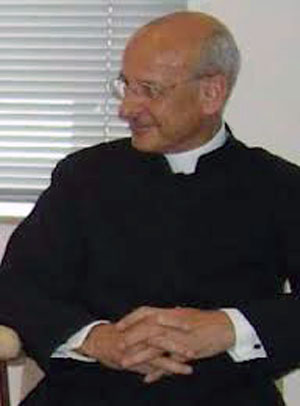
Msgr. Ocariz questions the continuity of some documents of Vatican II
�The problem is not to know whether the absolute and all-encompassing assistance of the Holy Spirit would be possible in principle. Of course it would. In fact, however, Our Lord did not want to endow St. Peter, the College of Bishops with the Pope, or ultimately the Church, with assistance in such absolute terms. God's ways are not always our own. The bark of Peter is subject to storms.
�In short, traditional theology affirms that, according to Revelation, assistance from the Holy Spirit was not promised and therefore not guaranteed in all cases and circumstances in such an unrestricted way. The assistance guaranteed by Our Lord covers all extraordinary definitions without exception, both papal and conciliar. But monumental theological works, especially in the silver age of Scholasticism, show that it is possible for errors and even heresies to exist in papal and conciliar pronouncements not guaranteed by infallibility.� This is what I am now reaffirming. ...
Three respectful requests to Archbishop M�ller
14. A Catholic Profession of Faith � In view of the above text by the Prefect of the Congregation for the Doctrine of the Faith, I hereby request that he accept the profession of faith I now make in everything that Holy Church authentically teaches; in her dogmas, both the extraordinary papal and conciliar Magisterium and the dogmas of the ordinary and universal Magisterium. I also affirm my entire acceptance of all the other truths of Catholic doctrine, each with the theological qualification that traditional doctors attribute to it. And I reject the accusation that I have fallen into heresy through an attachment to Tradition as theologically unfounded and factious.
15. The Meaning and Scope of the Condemnation � Given the need for precision in a statement with such a theological scope as the condemnation, though strictly doctrinal, of a current of thought highly significant in the whole Catholic world, I ask Archbishop M�ller to further clarify the theoretical and practical scope of his anathema with regard to the observations in item 8 above. On making this request, I have in view also the salvation of simple souls who faithfully uphold the dogmas of transubstantiation and the Virginity of Mary before, during and after partition, and all other Catholics who lack access to subtle theological distinctions and whose faith could be shaken by the news that the Prefect of the former Holy Office has declared that traditionalists, without distinction, are heretics.
16. On the Possibility of Error In Documents of the Magisterium � As a faithful Catholic keenly aware of the authority of the Vatican Dicasteries and also as an author of writings with considerable readership for which I feel responsible before Our Lord, I believe I am entitled to make a filial request to the Prefect of the Congregation for the Doctrine of the Faith: that he state in a formal, clear and specific way whether the thesis sustained in my mentioned works is false; I ask the same for the thesis I now sustain that it is theologically possible for errors and even heresies to exist in papal and conciliar documents that do not fulfill the conditions necessary for infallibility.
17. On this Holy Christmas eve, invoking the Divine Infant, His Most Holy Mother and St. Joseph, Patron of the Universal Church, I publicly make these considerations and requests in legitimate self-defense, cum moderamine inculpatae tutelae [a moderate and blameless defense], given that the aggression sustained was public.
- footnote 1
- footnote 2
- footnote 3
- footnote 4
- footnote 5
Posted October 8, 2013
______________________
______________________








